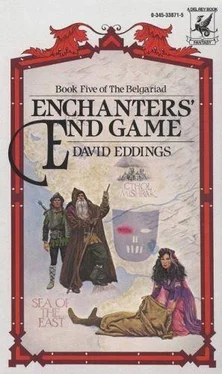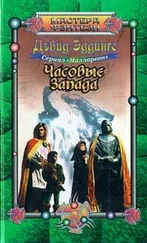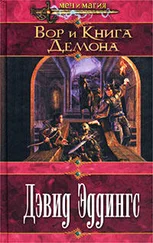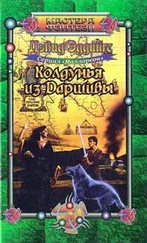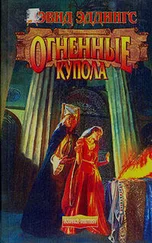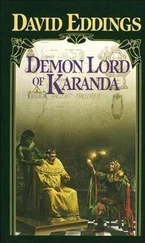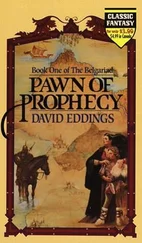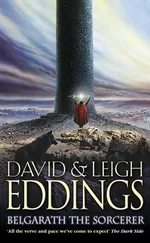David Eddings - Enchanter's End Game
Здесь есть возможность читать онлайн «David Eddings - Enchanter's End Game» весь текст электронной книги совершенно бесплатно (целиком полную версию без сокращений). В некоторых случаях можно слушать аудио, скачать через торрент в формате fb2 и присутствует краткое содержание. Жанр: Фэнтези, на английском языке. Описание произведения, (предисловие) а так же отзывы посетителей доступны на портале библиотеки ЛибКат.
- Название:Enchanter's End Game
- Автор:
- Жанр:
- Год:неизвестен
- ISBN:нет данных
- Рейтинг книги:3 / 5. Голосов: 1
-
Избранное:Добавить в избранное
- Отзывы:
-
Ваша оценка:
- 60
- 1
- 2
- 3
- 4
- 5
Enchanter's End Game: краткое содержание, описание и аннотация
Предлагаем к чтению аннотацию, описание, краткое содержание или предисловие (зависит от того, что написал сам автор книги «Enchanter's End Game»). Если вы не нашли необходимую информацию о книге — напишите в комментариях, мы постараемся отыскать её.
Enchanter's End Game — читать онлайн бесплатно полную книгу (весь текст) целиком
Ниже представлен текст книги, разбитый по страницам. Система сохранения места последней прочитанной страницы, позволяет с удобством читать онлайн бесплатно книгу «Enchanter's End Game», без необходимости каждый раз заново искать на чём Вы остановились. Поставьте закладку, и сможете в любой момент перейти на страницу, на которой закончили чтение.
Интервал:
Закладка:
“Beldin, of course.” Polgara smiled. “He wasn’t a very good mother, but he did the best he could until father returned.”
“Is that why you’re so fond of him?”
“One of the reasons, yes.”
The ominous cloudbank still did not move. It stretched across the sky as stationary as a range of mountains; as they rode toward it, it loomed higher and higher.
“That’s a very strange cloud,” Durnik noted, looking speculatively at the thick curtain of purple ahead. “The storm is coming in behind us, but that cloud doesn’t seem to be moving at all.”
“It doesn’t move, Durnik,” Polgara told him. “It never has moved. When the Angaraks built Cthol Mishrak, Torak put that cloud there to hide the city. It’s been there ever since.”
“How long is that?”
“About five thousand years.”
“The sun never shines there?”
“Never.”
The Grolim Archpriests had begun to look about with a certain apprehension, and finally Urtag called a halt. “We must make ourselves known,” he declared. “We don’t want the watchers to mistake us for intruders.”
The other Archpriests nodded nervously, and then all removed polished steel masks from beneath their robes and carefully covered their faces with them. Then each of them untied a thick torch from his saddle and ignited it with a brief, mumbled incantation. The torches burned with a peculiarly green-tinged flame and gave off a reeking, sulfurous smoke.
“I wonder what would happen if I were to blow out your torches,” Polgara suggested with a hint of a mischievous smile. “I could, you know.”
Urtag gave her a worried look. “This is no time for foolishness, my Lady,” he warned her. “The watchers are very savage with intruders. Our lives depend on those torches. Please don’t do anything to bring down a disaster on us all.”
She laughed lightly and let it go at that.
As they rode in beneath the cloud, it grew steadily darker. It was not precisely the clean darkness of night, but was rather a kind of dirty murkiness, a deep shade hovering in the air. They crested a rise and saw before them a cloud-enshrouded basin, and in its center, half obscured by the pervasive gloom, stood the ravaged City of Night. The vegetation around them had shrunk to a few sparse weeds and an unhealthy looking, stunted grass, pale and sick for want of sun. The boulders thrusting up out of the earth were splotched with a sort of leprous lichen that ate into the rock itself, and nodules of a white fungus lumped in grotesque profusion, spreading out across the dank soil as if the ground itself were diseased.
With a slow, careful pace, their sputtering torches held above their heads, the Grolim Archpriests led the way down into the gloomy basin and across the unwholesome plain toward the shattered walls of Cthol Mishrak.
As they entered the city, the princess saw furtive hints of movement among the tumbled stones. Shadowy forms scurried from place to place among the ruins, and the sound of their movements was the clicking scrape made by creatures whose feet were clawed. Some of the shapes were upright, others were not. Ce’Nedra grew cold and afraid. The watchers of Cthol Mishrak were neither beast nor human, and they seemed to exude a kind of indiscriminate malice toward all other living things. More than anything, she was afraid that one of them might suddenly turn and confront her with a face that might rip away her sanity by its hideousness.
As they passed down a broken street, Urtag began to intone an ancient prayer to Torak, his voice hollow and shaking. The dank air grew colder, and the diseaselike lichen ate at the tumbled stones of the ruined houses. Mold seemed to cling to everything, and the pale fungus grew in grotesque lumps in corners and crannies. The smell of decay was everywhere, a damp, rotten stench, and slimy pools of stagnant water lay among the ruins.
In the center of the city stood the rusted stump of a vast iron tower, the broken-off girders which had supported it thicker than a man’s waist. Just to the south of the stump lay a broad, rusted trail of total destruction where the tower had fallen, crushing everything beneath it. Over the eons, the iron had rusted down into a sort of damp red mud that outlined the enormous dimensions of the fallen structure.
The stump had eroded down, the years rounding off the broken edges. The rust mingled in places with a kind of thick black ooze that ran down the faces of the iron plates like gobbets of clotted blood.
Urtag, trembling visibly now, dismounted before a vast, arched portal and led them through a half open iron door. The echoing chamber they entered was as large as the Imperial throne room in Tol Honeth. Wordlessly, his torch held high over his head, Urtag led them across the pitted floor to another iron-arched doorway and then down a flight of clanging iron steps that reached into the darkness beneath. At the bottom of the stairs, perhaps fifty feet below the wreckage above, stood another door of black iron, studded with great, round rivetheads. Hesitantly, Urtag rapped his knuckles on the door, and the sound of his rapping echoed hollowly in the chamber beyond.
“Who comes to disturb the slumber of the Dragon-God of Angarak?” a muffled voice demanded from behind the door.
“I am Urtag, the Archpriest of Camat.” The Grolim’s voice was frightened. “As commanded, I bring the prisoners to the Disciple of Torak.”
There was a moment of silence, and then the rattling sound of an immense chain, followed by the grating of an enormous bolt. Then slowly, creakingly, the door opened.
Ce’Nedra gasped. Standing in the doorway was Belgarath! It was a moment before her startled eyes began to sort out the subtle differences that informed her that the white-haired man before her was not indeed the old sorcerer, but rather someone who looked so much like him that they could easily pass for brothers. Subtle though the differences were, they were nonetheless profound. In the eyes of the man in the doorway there was a haunted look—a look compounded of grief and horror and a dreadful self loathing, all overlaid with the helpless adoration of a man who has given himself utterly to a dreadful master.
“Welcome to the tomb of the one-eyed God, Polgara,” he greeted the sorceress.
“It’s been a long time, Belzedar,” she replied in an oddly neutral voice.
“I’ve given up the right to that name,” he told her, and his tone was faintly regretful.
“It was your decision, Zedar.”
He shrugged. “Perhaps,” he said. “Perhaps not. Maybe what I’m doing is also necessary.” He pushed the door open wider. “Come inside, if you will. This crypt is habitable—if only barely.” He looked directly at Urtag then. “You have performed a service, Urtag, Archpriest of Torak, and a service should not be unrewarded. Come.” And he turned and led them back into the vaulted chamber beyond. The walls were of stone, massive blocks set without mortar, and bolted to the topmost tier were great iron arches supporting the ceiling and the immense ruin above. The great chill of masses of cold stone and iron was held off by large, glowing braziers set in each corner. In the center of the room stood a table and several chairs, and along one wall lay a cluster of loosely rolled pallets and a neat stack of gray woolen blankets. On the table stood a pair of large candles, their flame unwinking and steady in the dead air of the tomb.
Zedar paused briefly at the table to pick up one of the candles, then led them across the flagstone floor to an arched alcove set in the far wall. “Your reward, Urtag,” he said to the Grolim. “Come and behold the face of your God.” He lifted the candle.
Lying upon its back on a stone bier within the alcove lay a huge figure, robed and cowled in black. The face was concealed by a polished steel mask. The eyes of the mask were closed.
Читать дальшеИнтервал:
Закладка:
Похожие книги на «Enchanter's End Game»
Представляем Вашему вниманию похожие книги на «Enchanter's End Game» списком для выбора. Мы отобрали схожую по названию и смыслу литературу в надежде предоставить читателям больше вариантов отыскать новые, интересные, ещё непрочитанные произведения.
Обсуждение, отзывы о книге «Enchanter's End Game» и просто собственные мнения читателей. Оставьте ваши комментарии, напишите, что Вы думаете о произведении, его смысле или главных героях. Укажите что конкретно понравилось, а что нет, и почему Вы так считаете.
